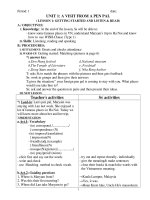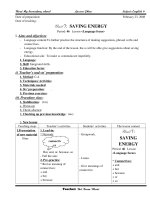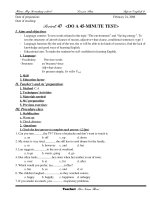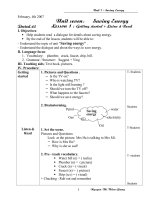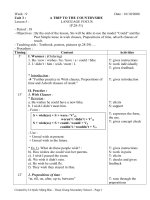anh9
Bạn đang xem bản rút gọn của tài liệu. Xem và tải ngay bản đầy đủ của tài liệu tại đây (153.92 KB, 12 trang )
<span class='text_page_counter'>(1)</span>Grammar: I/ The Simple present tense of ordinary verb. ( thì hiện tại đơn của động từ thờng.) 1/ C«ng thøc: a/ Khi các chủ từ ( Subject) là : I, We, You, They, hoặc các danh từ số nhiều thì động từ đợc chia ë d¹ng nguyªn mÉu kh«ng To. Subject + verb +… . Ex: I go to school in the morning. ( T«i ®i häc mçi s¸ng). I do my homework in the evening ( T«i lµm bµi tËp vµo buæi tèi ). b/ Khi các chủ từ ( Subject) là ngôI thứ 3 số ít : He. She, it, các danh từ số ít , thì động từ thờng ph¶I thªm s hoÆc es. Subject + verb ( s / es ) +… Ex: He lives in T©n Hµ. ( CËu Êy sèng ë Tan Hµ). She gets up early in the morning ( C« Êy dËy sím vµo buæi s¸ng) * C¸ch thªm S/ES - Khi động từ có chữ cuối cùng là O, S, X, Z, CH, SH, ta phảI thêm ES. Watch Watches. Go goes. Wash Washes. Do Does. - Khi động từ có tận cùng là: CE, SE, GE, ta chỉ thêm S vào sau động từ. Change Changes. - Các động từ tận cùng là : Y + Trớc Y là 1 phụ âm ta đổi Y I rồi sau đó thêm es. Cry Cries. + Tríc Y lµ 1 nguyªn ©m ( a, e , i , o , u ). Ta chØ cÇn thªm s. Play plays. 2/ Cách dùng: thì hiện tại dùng để diễn tả một thói quen, hành động xảy ra có tính lặp đi lặp lại. hay mét sù thËt hiÓn nhiªn. II/ The Present continuous tense. ( Th× hiÖn t¹i tiÕp diÔn ). 1/ C«ng thøc: a/ Thể khẳng định: ( Affirmative). Subject + am/ are / is + V-ing. Ex: I am learning my English ( T«i ®ang häc tiÕng anh ) He is reading his book. ( Ông ta đang đọc sách ) b/ Thể phủ định ( Negative ). Subject + am/ are / is + not + V-ing. Ex: they are not working now. B©y giê hä kh«ng lµm viÖc. She is not studying now. She is watching TV. C« Êy kh«ng häc bµi. c« Êy ®ang xem TV c/ ThÓ nghi vÊn ( Interrogative ). Am/ are / is + Subject + V-ing…. ? Ex: Are you waiting for me? B¹n ®ang chê t«I h¶? Yes, I am: Vâng đúng vậy. No, I am not. Kh«ng t«I kh«ng ph¶i. 2/ Cách dùng: Thì hiện tại tiếp diễn dùng để diễn tả một hành động đang xảy ra ở thời điểm nói thờng đI víi c¸c tõ now ( ngay b©y giê ). Right now ( ngay b©y giê ). At present ( Lóc nµy). at the moment ( lóc nµy). III/ Các đại từ nhân xng làm tân ngữ..
<span class='text_page_counter'>(2)</span> Subject ( chñ tõ ) Object ( T©n ng÷ , hay vÞ ng÷). I me You you He him She her It It We us They their. Ex: A farmer is waiting for him . ngêi n«ng d©n ®ang chê «ng Êy. She plays tennis with me. C« Êy ch¬I quÇn vît víi t«i. IV/ §éng tõ khiÕm khuyÕt Can ( Cã thÓ ). ( Modal auxilliary ). Can dùng để diễn tả một khả năng, một sự cho phép. Hoặc một yêu cầu. a/ thể khẳng định ( Affirmative ). Subject + Can + Verb ( Nguyªn mÉu) . Ex: I can play tennis. T«I cã thÓ ch¬I tennis. She can ride bycicle. Cô ấy có thể đi xe đạp. b/ Thể phủ định ( Negative). Subject: + cannot + Verb ( Nguyªn mÉu) . Ex: she can’t drive a car. C« Êy kh«ng thÓ l¸I xe h¬i. They can’t watch TV. Hä kh«ng thÓ coi TV. c/ ThÓ nghi vÊn ( Interrogative). Can + Subject: + verb ( Nguyªn mÉu) ? . Ex: Can you speak english ?. B¹n cã thÓ nãi tiÕng anh kh«ng. Yes, I can. V©ng t«I cã thÓ. No, I can’t. kh«ng t«I kh«ng thÓ nãi tiÕn anh. Can I help you? T«I cã thÓ gióp g× cho b¹n? Can you help me? B¹n cã thÓ gióp t«I kh«ng. V/ §éng tõ khiÕm khuyÕt Must ( Ph¶i). modal auxilliary). động từ khiếm khuyết Must diễn tả một sự bắt buộc, bổn phận. Nó chỉ có 1 thì hiện tại đơn duy nhất. động từ Must có hai hình thức phủ định là: Mustn’t và needn’t. a/ thể khẳng định ( Affirmative ). Subject + Must + Verb ( Nguyªn mÉu) . Ex: I must play tennis. T«I ph¶i ch¬I tennis. She must ride bycicle. Cô ấy phải đi xe đạp. b/ Thể phủ định ( Negative). Subject: + must not + Verb ( Nguyªn mÉu) . Ex: she mustn’t drive a car. Cô ấy không đợc phép láI xe hơi. They mustn’t watch TV. Họ không đợc phép coi TV. c/ ThÓ nghi vÊn ( Interrogative). Must + Subject: + verb ( Nguyªn mÉu). ? . Ex: Must you speak english ?. B¹n ph¶I nãi tiÕng anh kh«ng?. Yes, I can. V©ng t«I cã thÓ. No, I can’t. kh«ng t«I kh«ng thÓ nãi tiÕn anh. VI/ TÝnh tõ miªu t¶ ( Secriptive adjectives )..
<span class='text_page_counter'>(3)</span> Thờng đợc đặt sau động từ To Be hay trớc danh từ để nói về tình trạng hay tính chất, mài sắc hay kÝch thíc cña ngêi hay sù vËt hay sù viÖc. tÝnh tõ: ( adj): tall (cao), bad ( xÊu), good ( tèt), big ( to), small ( nhá). 1/ Tính từ miêu tả đứng sau và làm bổ ngữ cho động từ To Be. Subject: + Be + Adjective Ex: She is tall. C« Êy th× cao. You are big. B¹n th× to. 2/ Tính từ miêu tả đứng trớc danh từ và bổ nghĩa cho danh từ đó. Subject: + Be + ( a/an) + Adjective + Noun Ex: He is a tall man. «ng Êy lµ mét ngêi cao. She is a good friend. C« Êy lµ ngêi b¹n tèt. VII/ Cấu trúc để hỏi về nghề nghiệp: What + be + subject ? HoÆc dïng cÊu tróc: What + Do/ Does + Subject + Do ? Ex: What is she? C« Êy lµm nghÒ g×? What does she do? C« Êy lµm nghÒ g×? She is a student. C« Êy lµ häc sinh. VIII/ CÊu tróc hái vÒ mµu s¾c. What + color+ be( is/ are ) + subject ? Ex: what color is your book? Cuèn s¸ch cña b¹n mµu g×? §Ó tr¶ lêi ta dïng cÊu tróc: Subject: + Be + Adjective … Ex: it is blue ( nã th× mµu xanh). What color are the doors? Nh÷ng c¸I cöa th× mµu g×? They are grey. Chóng th× mµu x¸m. IX/ CÊu tróc Would like….: 1/ §Ó diÔn t¶ mét ý muèn lÞch sù ta dïng cÊu tróc. Subject + Would like +noun / to – infinitive Trong đó Noun: lµ danh tõ hay côm danh tõ To – Infinitive: là động từ nguyên mẫu có To Ex: I would like a cup of coffee. T«I muèn mét t¸ch cµ phª. He would like to see the TV. CËu Êy muèn thÊy TV. 2/ Để hỏi ngời nào đó về ý muốn lịch sự ta dùng cấu trúc. What + Would + Subject + like +noun / to – infinitive ? Ex: What would you like to drink ? B¹n thÝch uèng c¸I g×? What woud you like to eat ? B¹n thÝch ¨n c¸I g× ? 3/ §Ó mêi ai lµm g×, ®I ®©u, hoÆc ¨n uèng ta dïng cÊu tróc: Would + you + like +noun / to – infinitive ? Ex: would you like to go to the cinema?: b¹n cã thÝch ®I xem phim kh«ng? Yes, please. HoÆc yes, I’d love to. HoÆc I’ d like one. ( V©ng t«I thÝc) No, thanks. I can’t. ( kh«ng c¶m ¬n. t«I kh«ng thÓ ) X/ C¸ch dïng some vµ any ( mét vµi). Some và Any là các chỉ định từ bất định. Dùng với danh từ không đếm đợc hoặc danh từ đế đợc sè nhiÒu..
<span class='text_page_counter'>(4)</span> 1/ Some ( Một vài, một ít) : Dùng trong câu khẳng định và đôI khi dùng trong câu hỏi. Trớc danh từ không đếm đợc và đếm đợc số nhiều. Ex: There is some water in the bottle. Cã mét Ýt níc trong chai. Would you like some coffee? B¹n cã thÝch mét Ýt cµ phª kh«ng.? There are some books in my room. Cã mét vµi cuèn s¸ch trong phßng t«i. 2/ Any ( tí nào). dùng trong câu phủ định và nghi vấn. Trớc danh từ không đếm đợc và danh từ đếm đợc sè nhiÒu. Ex: There isn’t any tea in the cup. Kh«ng cßn tÝ níc trµ nµo trong t¸ch. Is there any butter in the fridge? Cã tÝ b¬ nµo trong tñ l¹nh kh«ng? yes, there is. V©ng cßn . No, there isn’t . kh«ng kh«ng cßn. There isn’t any students in the class room. Kh«ng cã mét häc sinh nµo trong líp c¶ Are there any eggs in the box? Cßn qu¶ trøng nµo trong hép kh«ng? XI/ Hỏi về số lợng. để hỏi về số lợng ta dùng cấu trúc sua. 1/ Hỏi Với danh từ đếm đợc số nhiều (plural countable noun). How many + plural countable noun + do/does + S + V( nguyªn mÉu) Ex: How many eggs do you want? Ban muèn bao nhiªu trøng? How many bananas does she have? B¹n cã bao nhiªu chuèi. 2/ Hỏi Với danh từ không đếm đợc (uncountable noun). How much + uncountable noun + do/does + S + V( nguyªn mÉu) Ex: How much water do you have? B¹n cã bao nhiªu níc. How much beef does he want? CËu Êy muèn bao nhiªu thÞt bß? XII/ Hỏi đáp về giá tiền. 1/ §Ó hái vÒ gi¸ tiÒn ta dïng cÇu tróc. How much + is + noun ( không đếm đợc/ đếm đợc số ít ) …? How much + are + noun ( đếm đợc số nhiều ) + ….? Ex: How much is your book? Cuèn s¸ch cña b¹n gi¸ bao nhiªu. How much are eggs? Trøng th× gi¸ bao nhiªu. 2/ §Ó tr¶ lêi: ta dïng cÊu tróc. Subject + is/are + sè tiÒn . Ex: the books is 15.000 ®, XIII/ Để hỏi về mức độ thờng xuyên của một hành ta dùng cấu trúc. How offten + do/does + subject + verb ( động từ nguyên mẫu) . Ex:. How offten do you watch TV? B¹n cã thêng xuyªn xem TV kh«ng? Every night. Mçi tèi. How offten does she listen to music? C« Êy cã thêng nghe nh¹c kh«ng? Offten. Thêng xuyªn. XIV/ Các trạng từ chỉ mức độ thờng xuyên với thì hiện tại đơn là: Trạng từ chỉ mức độ thờng xuyên bổ nghĩa cho động từ, diễn tả mức độn thờng xuyên của hành động. Thờng đI với câu hỏi : How offten …. . nó thờng đợc dùng trong thì hiện tại đơn. Always : luôn luôn. usually : Thờng thờng. Offten : thờng. Sometimes: đôI khi. Occasionally: thØnh tho¶ng. rarely : hiÕm khi. Never: kh«ng bao giê. Ex: she is offten late for school. C« Êy thêng trÔ häc..
<span class='text_page_counter'>(5)</span> He always washes his face in the morning, cËu Êy thêng röa mÆt vµo buæi s¸ng I.Choose and circle the best answer. 1.Would you like … chicken? (a/an/any) 2.What is your favorite … Mai? I like fish. (Vegetables/drinks/meat/food) 3.She does not want … meat. (a/an/some/any) 4.I want to buy … eggs. (a/an/some/any) 5. … apple juice is 3000 dong. (a/an/some/any) 6.How … eggs does he need? (many/much/do) 7.How … is bowl of rice at the canteen? It is 3000 dong (many/much/about) 8.She is … aerobics. (play/plays/does/doing) 9.What do you do … your free time? (at/on/in/about) I playing soccer and go fishing. 10.How … do you go fishing? Twice a week. ( ofen/many/much) 11.Do you like sports? … (Yes, a lot/ I would / No,I like it/ Yes, we are) 12. … sports does Lan plays? (When/Where/Which?How) 13.She listens to music three time … week. (once/a/two/and) 14.My father … football. (Does/ like/doesn’t/to play/play) II. Mach the question in A with the answer in B A B 1. What is Mai doing? a. She likes chicken. 2. How much do you want? b. A dozen, please. 3. How many eggs do you want? c. Three hundred grams, please. 4. Can I help you? d. I like fish. 5. What is your favorite food? e. Yes, I like some beef please. 6. How do you feel, Lan? f. No, there aren’t. 7. Are there any noodles? g. I’m hot and thirsty. 8. What does your mather like? h. She is playing football. III. Which one is different? 1. Milk coffee fish meat chair. 2. Beans carrots potatoes lamonead. 3. Chicken foodpaste egg beef. 4. Cooking oil kilo rice egg. 5. Swim play listen chocolate. IV. Fill in the blank with a word form the box Luch. leaves. in. eleven. teacher. near. goes. to. This is my teacher, Trang. She is a (1) . She teaches at a small school (2) the village. She gets up at six. Every morning she (3) the house at a quarter to seven. The school is not (4) her house so she (5) to work by bike. Her class starts at seven and finishes at (6). My sister goes home and has (7) at a quarter (8) twele..
<span class='text_page_counter'>(6)</span> True ( T ) or False ( F ). 1. Trang is a student. 2. She goes to bed at six. 3. She leaves home at a quarter to seven. 4. The school is near her house. 5. She has dinner at a quarter to twelve. (I.Chọn câu trả lời đúng nhất: ( 3m .I…………a student.1 a. am b. is c.are d.isn't .How……….. are you? I'm eleven.2 a.class b.old c.many d. much .There are two ……………. in the living room.3 a.bench b. benchs c. benches d.chair .My classroom is…………the first floor.4 a.on b.in c.the d.from .How many ………….are there in your family.5 a.father b.mother c.sister d.people .Ba………..his teeth every morning.6 a. brush b. brushes c. brushs d.brushing II. Đọc đoạn văn sau và điền vào chỗ trống với TRUE (T) hoặc FALSE (F Nam lives in the city with his father, mother, sister and brother.His house is next to a store.On the street , there is a restaurant , a bookstore and a temple.In the neighborhood, there is a hospital, a factory, a musium and a stadium. Nam's father works in the factory. His mother works in the .hospital ..……………… .Nam lives in the country .1 .……………… .His house is next to a store.2 .……………… .Nam's father works in the factory.3 .……………… .His mother works in the hospital.4 ..……………… .There are four people in his family.5 .(III. Viết câu theo hướng dẫn: (2.5m (He is a student. ( Đổi sang câu phủ định.1 ..………………………………………………………………………………………… (in / live / I / country / the (Sắp xếp các từ thành câu hoàn chỉnh.2 …………………………………………………………………………………………… (It's a ruler. ( Đặt câu hỏi cho câu trả lời .3 …………………………………………………………………………………………… (How do you go to school? ( Trả lời câu hỏi .4 …………………………………………………………………………………………… (We ( play)………………soccer now. ( Chia động từ trong ngoặc.5 II. Đọc đoạn văn sau : A.Chọn từ hay cụm từ đúng trong số A, B hoặc C điền vào khoảng trống : (1) Linh is twelve years old. She (1)_________ in grade 6. She lives in a house with her mother, father and brother. Their house is (2) ________ to a bookstore. In the neighborhood, there is a restaurant, a market and a stadium. Linh’s father (3) ________ in the restaurant..
<span class='text_page_counter'>(7)</span> Her mother works in the market. Linh goes to school at half past six in the morning. She has (4) _________ from seven to eleven fifteen. 1. A. is B. am C. are 2. A. next B. near C. between 3. A. works B. work C. working 4. A. classes B. class C. the class. B. Trả lời câu hỏi . (1.5) 1. How old is Linh? ………………………………………… 2. Does Linh’s father work in the restaurant? ……………………… 3. What time do her classes start? ………………………………….. III. Chọn câu trả lời đúng(3) 1. Nam ........................his teeth every morning . a. brushes b. brushs c. brush d. wash 2. There ......... four people in my family . a. are b. is c. am d.be 3. ...............do you get up ? At 5 o’clock . a.What time b. What c.How, d.Where 4. We have English ..................Monday and Wednesday . a-on b- in c-at d- with 5. Lan’brother ….volleyball now. a.to play b.is playing c.are playing d.playing 6. Lan lives ……… the city ………her family? a.in / with b.in / to c.at / with d.on / with IV. Sắp xếp các từ bị xáo trộn thành câu hoàn chỉnh.(2.5) 1.have / on / English / We / Monday / Saturday / and. ……………………………………………………………. 2. are/ mountains/ around /town/ there /many/ and/ rivers/our/. ………………………………………………………………. 3. books / the / table / are / Thu’s / on. ………………………………………………………………… 4. play / school / we / volleyball / often / after /./ ……………………………………………………………….. 5. How / floors / school / does / many / have / your / ? ………………………………………………………………… Phần 1 : TRẮC NGHIỆM KHÁCH QUAN Chọn phương án đúng nhất trong các câu sau : ( mỗi câu 0,5 điểm )1 Câu Lan and Hoa............... ten years old . 1: A am B is C are.
<span class='text_page_counter'>(8)</span> Câu 2:. That is my father .......................is thirty- nine years old . A B C. Câu 3:. Minh ...........................his face in the morning . A B C. Câu 4:. Câu 8:. what who how. Is she .......................grade seven ? yes, she is A B C. Câu 7:. book books a book. ..........................is that ? That is a map . A B C. Câu 6:. wash washes washs. How many .........................are there on the table ? There are four . A B C. Câu 5:. he she it. in on at. Lan’s brother ............................volleyball now . A is playing B are playing C play Nga and Hue do ..................................homework .. A his B her C their Phần 2 : TỰ LUẬN Bài 1 : 2_điểm Đọc đoạn văn sau và điền một từ thích hợp vào chỗ trống . Every morning , Nam gets up at six. He ......(1)......his face and brushes his..... (2)..........
<span class='text_page_counter'>(9)</span> At six- thirty, he eats his .....(3)......then he ....(4).........to school . At twelvethirty, he goes ....(5)........ and has lunch ...(6)...........the afternoon , .... (7)...........plays soccer . In the evening, he does his ...(8)........... then watches TV .He goes to bed at ten o’clock . Bài 2 :. Bài 3 :. 2điểm Tìm câu trả lời ở cột B ứng với câu hỏi ở cột A A B 1) Where does he play soccer ? a. I’m a student . 2) How do you go to school ? b. She’s eleven . 3) What do you do ? c. By bike . 4) Where is Long ? d.Thang Long school . 5)When do you have English ? e. In the yard . 6) What does your father do ? f. On Tuesday and Thursday . 7) Which school do you go to ? g. He’s in his room . 8) How old is Lan ? h. He’s a teacher . 2điểm Xếp thành câu hoàn chỉnh 1)Time / leave / the / what / morning / Miss / does / house / her / in / Nga / ? ......................................................................................................................... 2)Mr / son / do / how / and / travel / his / city / Minh / DN / ? / to / morning / every A. LANGUAGE FOCUS:. I/ Circle the correct answer 1/ These books …… small. a. are b. is c. do d. am 2/ She …. her face. a.wash b. washes c. brush d. brushes 3/ What is your father's name? …… father's name is Minh a.her b. their c. his d. my 4/ We listen … music. a. at b. on c. to d.in 5.….. do they do ? They are teachers. a.which b. where c. when d. what 6/ What …. your father do? a. do b. does c. is d.am 7/ Do you play soccer? Yes,…… a.I do b. I don't c. I do d we don't 8/ How old is his sister? …. is fifteen years old. a.he b. she c. I d. we 9/ How many …. are there? There are ten teachers..
<span class='text_page_counter'>(10)</span> a.engineers b. teacher c. teachers d. doctors 10/ The yard is in … of the house. a. front of b. front c. behind d. left B. READING: II/ Complete the passage by filling in each gap with one word from the box and answer the questions .(3m) Hoa is a student. She(1)…… up at five o'clock. She (2)…. a shower and gets dressed. She (3)… her breakfast then leaves the(4) ….at half past six. The school is (5)….. her house , so she walks. Classes starts at seven and end at half past eleven. He walks home and has lunch at twelve o'clock. Takes house gets eats near D. WRITING: IV. Complete the sentences from the cues given: 1. How many /people/ there/ your family? ………………………………………………………………. 2. My name/ Lan ………………………………………………………………. 3. There /20 students/ my class ………………………………………………………………. 4.I /go/ school/ bike ………………………………………………………………. 5. Do /you /live/ city ? ………………………………………………………………. I.Choose the best answer (5m) 1. ..... that your teacher? A. Is B. Are C. Am D. What 2. Where is your ......?- It's in the city. A. name B. house C. teacher D. student 3. .......classrooms are there in your school? A.How B.How old C.How many D.How much 4. They have lunch at half.... eleven. A. quarter B.past C.to D.o'clock 5. There..... a hotel near the lake. A. be B. is C. are D. have 6. ...... does Mrs Thao go to work?- By motorbike A.What B.Where C. How D. Who 7. Who is waiting.......you. A.at B. with C.for D.of 8. We live..... Tran Hung Dao street. A.in B. at C. up D. on 9. Ba ...... dressed at six o'clock every morning. A. gets B. get C.getting D. is getting 10. She doesn't do homework after school. A. her B. his C. my D.our 11. The tree is ..... to the toystore..
<span class='text_page_counter'>(11)</span> A. near B.next C. behind D. opposite 12. Is there a...... behind Lan's house? A. garden flower B. flower garden C.flower of garden D. all are correct II.Choose the best answer to complete the text:(2m) Hello, I am Trang. I'm ..(1)...years old and I'm in grade..(2)...eleven. I ..(3)...in a house with my family: my father, my mother, my brother and...(4)...My father is a teacher and... (5)...forty-eight years old. My mother is a teacher, ..(6)... She is forty-six years old. My..(7)...is twenty-three. He..(8)...engineer. 1.A. seven B. seventeen C.seventh D. seventeenth 2.A. lives B. am live C. live D. am lives 3.A. am B. is C. are D. have 4.A. me B. my C. I'm D. I 5.A. he has B. he's C. his D. he 6.A. and B. but C. too D. so 7.A. father B. sister C. mother D. brother 8.A. a B. an C. the D. one III. Put the following words in the correct order. (1m) 1. Nam/ are/ and/ quang/ playing/ soccer/ now. 2. have/ We/ on/ History/ Tuesday/ Thursday/ and. VI. Make question for the following answer. (1m) 1. I live on Tran Hung Dao street. 2. I go to school at 6:30 o'clock every morning. Phần A:Trắc nghiệm (4điểm). 1. The living- room ……….. a table and four chairs. A.has B. have C. is having D. are having 2. These boobs are on the shelf ……… the right. A. on B. to C. by D. in 3. My new school is ……….. than my old school. A. big B. bigger C. biger D. biggest 4. Would you like ………… a movie? A. see B. to see C. seeing D. sees 5. ……….. an awful restaurant ! A.Where B.Who C. What D. Which 6. What about ………… to music ? A. listen B. listening C. listens D. to listen 7. My mother takes of sick people. She is a ………… A.farmer B. teacher C. nurse D. worker 8. Mai learns …………. to use computer every Sunday. A. how B. what C. where D. who Phần B: Tự luận (6diểm) Bài 1: Cung cấp thì đúng của các động từ trong ngoặc.(2đ) 1. Where is Lan ? Lan( read)………….. in the library . 2. We (wacth) ………….. TV every night. 3. My mother (visit) …………….. my grandmother tomorrow. 4. I (walk) …………. to school every day..
<span class='text_page_counter'>(12)</span> Bài 2: Sắp xếp các từ bị xáo trộn thành câu hoàn chỉnh.(2đ) 1. Ba / his / name /is. ………………………………… 2. old / years / 13 / is / he. ………………………………… 3. lives / Le Do street / at 20 / he. ………………………………… 4. by / bike / goes / to/ he / school. …………………………………… Bài 3. Đọc đoạn sau rồi chọn câu nào đúng (True) và câu nào sai(False): (2đ) I think schools in Viet Nam are different fromschools in the USA. Vietnamese students usually wear school uniform. Classes start at 7 o’clock in the morning and end at 5:15 in the afternoon. There lessons on Saturdays. Students have a 15-minute break after two periods. At break, many students play games. Some go to the canteen and buy snacks or drinks. Some others read or talk together. Our school year usually lasts for nine monhts from September to May. Then students have a three- month summer vacation. True(T) Fasle(F) 1. In Viet Nam, the school year begins in October. ….………….. 2. Vietnamese students do not wear school uniform. ..……………. 3. There are lessons on Saturday. .…………….. 4. The summer lasts for two months. …………….....
<span class='text_page_counter'>(13)</span>
